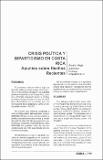| dc.contributor.author | Vega Sánchez, Álvaro | |
| dc.date.accessioned | 2020-11-03T22:46:11Z | |
| dc.date.available | 2020-11-03T22:46:11Z | |
| dc.date.issued | 2005-12 | |
| dc.identifier.issn | 2215-2997 | |
| dc.identifier.other | https://www.revistas.una.ac.cr/index.php/abra/article/view/4198/4038 | |
| dc.identifier.uri | http://hdl.handle.net/11056/18510 | |
| dc.description.abstract | El presente artículo ofrece algunos apuntes sobre el impacto que está teniendo la crisis política actual en los partidos políticos mayoritarios en Costa Rica, a saber, el Partido Liberación Nacional (PLN) y el Partido Unidad Social Cristiana (PUSC). Este bipartidismo es concebido hoy, por buena parte de la ciudadanía, como un único poder bicéfalo: PLUSC. Se plantea que estamos asistiendo a una reconfiguración del escenario políticopartidista de cara a una nueva ciudadanía política costarricense más crítica y decidida a demandar del liderazgo político, coherencia, voluntad y transparencia, para enfrentar los grandes retos de una sociedad cada vez más polarizada social y económicamente. En concreto se recoge, en apretada síntesis, el itinerario seguido por el bipartidismo desde su conformación hasta sus transformaciones recientes, que constituyen una expresión fundamental de la crisis política en la coyuntura actual. No se pretende mostrar un diagnóstico riguroso de la crisis política, sino más bien ofrecer una valoración de algunos hechos significativos que ponen en evidencia dicha crisis y su relación con el bipartidismo | es_ES |
| dc.description.abstract | The following article offers some notes
on the impact that the recent political crisis
is having on majority Costa Rican political
parties, notably the PLN (Partido Liberación
Nacional) and PUSC (Partido Unidad Social Cristiana) parties. This bipartisanism is
viewed today by a large percentage of citizens as a single two-headed power: the
"PLUSC".
It has therefore become evident that we
are on the brink of a reconfiguration of the
political scenario, due to a new breed of
Costa Rican citizens who are more critical
and determined to demand from the political leadership coherency, goodwill and
cleamess, in order to face the big challenges of a more and more socially and economically divided society Overall, this article summarizes the itinerary followed by bipartisanism, from its
initial stages to its recent transformations, which constitute the fundamental expression of the political crisis on the current juncture.
The intention is not to rigorously diagnose the existing political crisis, but rather
to offer an evaluation of sorne significant
events that evidence said crisis and its association to bipartisanism. | es_ES |
| dc.description.sponsorship | Universidad Nacional, Costa Rica | es_ES |
| dc.language.iso | spa | es_ES |
| dc.publisher | Editorial de la Universidad Nacional | es_ES |
| dc.rights | Acceso abierto | es_ES |
| dc.rights.uri | http://creativecommons.org/licenses/by-nc-sa/4.0/ | * |
| dc.source | Revista ABRA Vol. 25, No. 34, p. 119-140 | es_ES |
| dc.subject | CRISIS POLÍTICA | es_ES |
| dc.subject | POLITICAL CRISIS | es_ES |
| dc.subject | PARTIDOS POLÍTICOS | es_ES |
| dc.subject | POLITICAL PARTIES | es_ES |
| dc.subject | LIDERAZGO | es_ES |
| dc.subject | LEADERSHIP | es_ES |
| dc.subject | COSTA RICA | es_ES |
| dc.title | Crisis política y bipartidismo en Costa Rica. Apuntes sobre Hechos Recientes | es_ES |
| dc.type | http://purl.org/coar/resource_type/c_6501 | es_ES |
| dc.description.procedence | Escuela de Sociología | es_ES |


